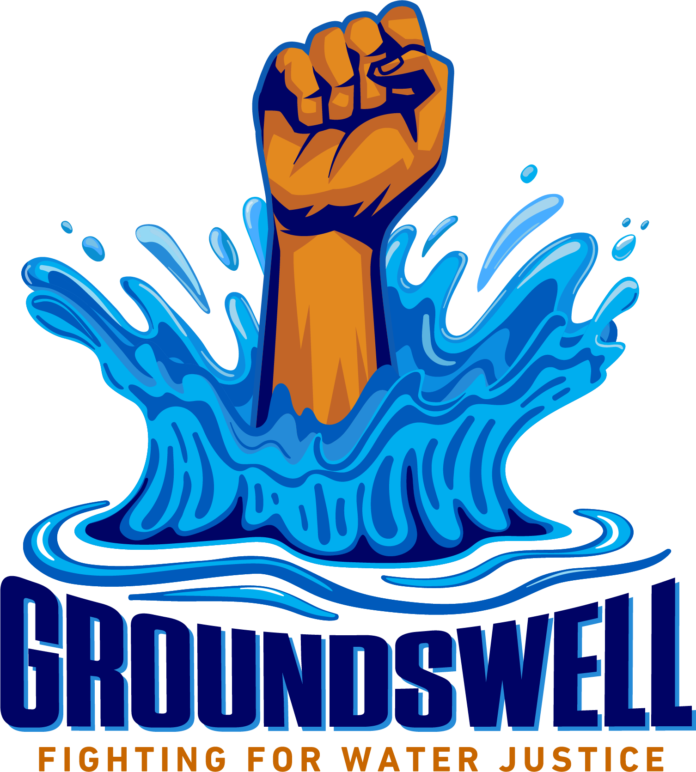
Social justice begins with access to safe, clean, affordable drinking water.
By: Groundswell
Of all the racism faced by people of color in the United States in the last century, the most pernicious is racism in access to safe, clean drinking water.
Hinkley, Flint, Brady, Compton, Vernon, Warm Springs. The names of these places have become synonymous with poisoned water, toxic waste and cancer in communities where the populations are majority Black, Latino, Native American and poor. The devastating health impacts suffered by communities of color due to lack of access to clean water are well-documented, indisputable and shameful. And, despite tens of billions of dollars in taxpayer funding for “clean water” projects – all claiming to prioritize disadvantaged communities – every single study confirms that, to this day, access to clean drinking water in the U.S. is still highly unequal, based on race, income, and geography.
Seven years after the poisoning of Flint, Michigan, California’s catastrophic drought once again brings the issue of water inequality for communities of color into stark relief. With water deliveries from State and Federal reservoirs reduced to zero, and local wells running dry, new names are cropping up: East Orosi, Needles, Tuviston, Kettleman City. Hundreds of small, unincorporated and disadvantaged communities across California have no water rights, no back up supplies and no technical or financial resources to develop sources of drinking water and are at severe risk of running out of water. Sixty-five percent of people living in these disadvantaged communities are people of color.[1]
Make no mistake about why communities of color are most heavily impacted by drought. Access to water is tied to housing and deeply rooted in the exclusion zones, land theft, redlining and racial covenants that forced people of color to form communities outside of city limits where municipal gerrymandering and deliberate lack of investment in infrastructure for basic services left Black, Brown and Native American communities without water, sewage, and electricity for generations.
Litigation over access to water is as old as America itself, but people of color haven’t had a direct stake in California’s water wars, in part, because the laws and regulations being litigated are based on water rights granted to White settlers and wealthy businesses before African Americans, Native Americans or Mexican Americans were even recognized as citizens, let alone allowed to own land in the U.S.. Moreover, the established “stakeholders” include well-funded environmental lawyers representing endangered species and plants, who wrote many of the laws now used to deny disadvantaged communities access to water. These groups spend millions of dollars each year filing lawsuits against projects that facilitate population growth and allow humans to infringe on the habitat and water rights of species and plants they represent, even if it means continued suffering in communities of color.
It is not hyperbole to say that a fringe-toed lizard has more rights to safe, clean water than thousands of Black and Brown children living in Compton or East Los Angeles today.
Laws passed in recent years declaring access to clean water to be a “human right” ring hollow when the judicial system that Black and Brown people must rely on to protect our right to access clean water is the same judicial system that zealously enforced overtly racist laws denying us access to schools, housing, voting booths, drinking fountains and the halls of justice until forced to do so by insuppressible protests or the occasionally enlightened Supreme Court.
Unlike the well-funded army of special interests that have long dominated California’s water wars, disadvantaged communities have been largely unrepresented – and ignored. Our social justice and civil rights advocacy efforts have focused on protecting the right to vote, to work for fair wages under fair conditions, and to achieve equity and justice in education, medical care, law enforcement and housing. But, the fact is, water is life; And none of our social justice priorities can be achieved without access to safe, affordable and reliable water.
Social justice organizations can no longer stand on the sidelines while government and environmental lawyers decide which communities get access to safe drinking water and which do not. We cannot be silent when policymakers suggest without embarrassment that the financial “benefits” of not getting cancer should be factored into the higher costs disadvantaged communities should pay to drink uncontaminated water. We cannot allow any lawyer, any government official, or any politician to weigh the value of our children’s lives against the habitat of an endangered species – not without a fight.
Water is life. Communities of color must begin to fight for it like our lives depend on it.
Groundswell is a project of Community Build, Inc. We are a movement driven organization that is joining forces with the League of United Latin American Citizens, San Gabriel Valley Coalition for Secure Water, Rebuild Southern California Partnership, Laborers International Union of North America and other organizations representing small and disadvantaged communities in fighting for access to water that is safe, affordable, reliable and climate resilient.
Our work is supported by respected members of the communities we serve, including Reverend William Smart, Southern Christian Leadership Conference (SCLC), Reverend K.W. Tullos, Pastor John E. Cager III, Pastor Larry Minor, Pastor Rodney Ross, Dr. Moses McCutcheon, Pastor Desmond Pringle, Katherine Myers, Candida Centieo, Dawn Franks, Pastor Ricky Beasley, Reverend Adrienne Zackery, Pastor Jabari Cole, Minister Wyman Baker, Reverend Ivan Servillano, Dr. Michael Jamerson, and Dr. Velma Union.


